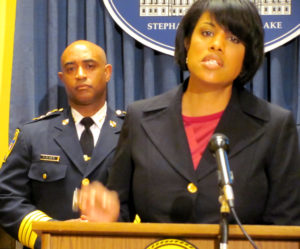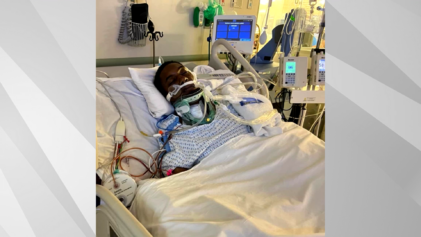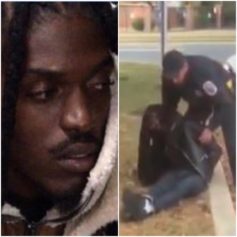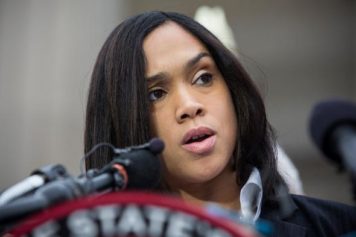It has been repeated to Black people so often that it has taken on the aura of conventional wisdom: If you want to change your circumstances, go to the ballot box and vote. But the experiences of Black residents in Baltimore are showing the limitations of the political process. The mayor is Black, the police commissioner is Black, half of the cops are Black—yet Black bodies are still being brutalized.
Days after the mysterious death of Freddie Gray, 25, at the hands of Baltimore police, the anger in the city is palpable—expressed through protest marches and the frustrations of Black residents. Their sentiments were captured in a Washington Post profile by Paul Schwartzman.
“It doesn’t matter who’s in the top positions — white, Black, Asian,” Earl Williams, 52, an African American man, told the Post as he sat on his front steps around the corner from where police first tackled Freddie Gray on April 12 before he was hospitalized and died a week later from a broken spine.
“Why should I feel different that a Black woman is mayor and a Black man is chief when they’re not doing anything?” he asked. “We’re tired of seeing our young Black men getting beaten.”
It is a painful reality for many Black people to accept, after so much focus in their lifetimes has been placed on the magic of the vote—particularly coming out of a period in the nation’s history when many Black people were beaten and even killed fighting for the right to vote. But the systemic nature of American racism, and the oppositional mindset of American law enforcement, which since its creation in the 1800s has treated Black people as the enemy, has shifted the thinking of many rank-and-file Black people to conclude that it’s going to take a lot more than voting to bring about long-lasting improvements in their lives.
The cases of police brutality and police-involved killings of Black people continue to stack up, with no end in sight. The proposed reforms that swirl about, like police body cameras or increased training or hiring more Black cops, feel so inadequate to the task of protecting Black lives. But how do you change a policing mindset that has been more than a century in the making?
The Washington Post detailed the descent of Baltimore into a city nationally known for crime and urban blight—a reputation solidified by the HBO series The Wire. After former mayor Martin O’Malley promised to get tough on crime and bring down the climbing violence and homicide rate, the number of arrests soared while the homicides dropped—a pattern that was repeated in cities across the country.
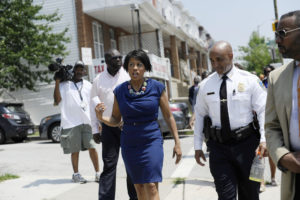
“It transcends whether the mayor is Black or not,” Lawrence Brown, a Morgan State University professor and community activist, told the Post. “Black people view policing as racist, and it doesn’t matter if the mayor is Black, the police chief is Black or the president is Black. There’s a long history of brutal policing in Black communities, so people don’t have any expectations.”
Residents in the West Baltimore neighborhood where Gray lived wondered why the mayor, Stephanie Rawlings-Blake, hadn’t visited. They had already gotten a visit from Police Commissioner Anthony W. Batts on Tuesday.
“She should be at the marches,” Charles Barden, 63, told the Post as he sat on his front steps. “She needs to answer the questions. People need to be heard.”
He said even if she doesn’t know all the facts, “it would show that she’s trying to help.”
There’s no doubt that Rawlings-Blake is in a difficult position—but one that would be familiar to the slew of Black big city mayors who have been elected with the Herculean task of bringing change to cities where the economic levers, the major corporations, the real estate markets and the financial systems are still in white hands.
The balancing act that Rawlings-Blake must walk has been evident, as she tries to placate the Black community while appearing that she is not rushing to judgment about the actions of the police force that works for her. Rawlings-Blake, 45, is a Baltimore native who served on the City Council before becoming mayor in 2010 and whose father Howard “Pete” Rawlings was a popular city leader as a member of the Maryland state legislature.
When she spoke earlier in the week, the mayor tried to show that she understood the community’s pain.
“I understand the community’s frustration. I understand it because I’m frustrated,” Rawlings-Blake said. “I’m angry that we are here again, that we have had to tell another mother that their child is dead. I’m frustrated that not only that we’re here, but we don’t have all of the answers. I want to know why the officers pursued Mr. Gray. I want to know if the proper procedures were followed. I want to know what steps need to be taken for accountability.”
“I can only view this work through the lens of an African American woman who grew up in Baltimore,” she said recently. She told the story of going to community meetings where she expected to hear from a community as excited as she was about the city’s dropping homicide rate.
Instead, she said she heard people who were “mad as hell about the way they were being treated by the police department.”
But in the eyes of many, her carefully chosen words have not been enough.
“Her response has been remarkably subdued,” Matthew Crenson, a Johns Hopkins University professor emeritus who is writing a history of Baltimore, told the Washington Post. “Whether or not the mayor is African-American doesn’t seem to make much difference in the minds of African-American residents. They’re angry, they’re marching, and they’d probably be doing the same no matter what the race is.”
“Blacks are saying, ‘You’re doing too little,’” said Carl Stokes, a Baltimore City Council member who is African-American. “You need to be screaming about this. If we are calm, something is wrong with our psyche and our acceptance of this.”
A well-known Baltimore pastor, Rev. Jamal Bryant, who said he co-hosted a town-hall meeting on crime at his church with the mayor last month, wondered why the mayor didn’t speak up while Gray was in a coma for a week.
“Where’s the accountability?” he asked in an interview. “We didn’t hear the outrage from her when the man was in a coma. We hear the sadness and disappointment upon his death. It felt like a politician was talking — that this is politically correct and I think that’s the sentiment in the street.”
“She’s stuck in the Cirque du Soleil trying to do a balancing act,” he said. “She’s going to lose some political capital from the electorate. The good choice is to have six police officers arrested. There seems to be a cloak of protection extended to the police that’s not extended to the citizens.”
The six officers have been suspended with pay while an investigation is conducted on how Gray’s spine was nearly severed during the course of being taken into custody and transported in a police van in shackles. Batts said his department would finish its investigation by May 1 and hand the results to the state’s attorney, Marilyn J. Mosby, for possible prosecution. Mosby released a statement that said her office had “dedicated all its existing resources to independently investigate this matter to determine whether criminal charges will be brought.”
But Gray’s family members have called on the federal government to take over the investigation, not believing the Baltimore police department can be trusted to investigate itself.
Meanwhile, the Washington Post spoke to a blind man who lives on the block who said he heard Gray yelling in pain.
“At about 8:30 in the morning. I heard this boy hollering and screaming, ‘Get off me, get off me. You’re hurting my neck, you’re hurting my neck, get your knee off my back,'” said Harold Perry. “Then two cars pulled up. One door slammed and the other door slammed. Then he got to screaming louder. He said, ‘I got asthma’ or something like that. He kept screaming and hollering….Then the police said, ‘Shut the f**k up!’ That’s what the policeman said to him.”
